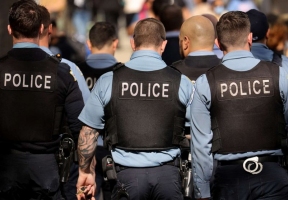By: Ashmar Mandou
 The Chicago City Council committee will hold a meeting on Wednesday to vote on Chicago’s potential curfew rules this summer in order to address ‘teen takeovers’ that have led to violence in downtown. The proposal by second Ward Ald. Brian Hopkins to allow Chicago Police Superintendent Larry Snelling to activate “snap curfews” with at least 30 minutes notice in order to curb teen takeovers. “Bringing in the police superintendent and the district commanders, it gives them the ability to apply this curfew when it’s needed and where it’s needed,” Ald. Hopkins said early April.
The Chicago City Council committee will hold a meeting on Wednesday to vote on Chicago’s potential curfew rules this summer in order to address ‘teen takeovers’ that have led to violence in downtown. The proposal by second Ward Ald. Brian Hopkins to allow Chicago Police Superintendent Larry Snelling to activate “snap curfews” with at least 30 minutes notice in order to curb teen takeovers. “Bringing in the police superintendent and the district commanders, it gives them the ability to apply this curfew when it’s needed and where it’s needed,” Ald. Hopkins said early April.
The new ordinance would allow Chicago Police Department Superintendent Larry Snelling or individual district commanders to activate earlier curfews in real time as situations change. Minors have 30 minutes to clear a public place before the curfew goes into effect. Those violating the curfew, including parents, could be fined $250 and community service.
In March, two people were shot at two different teen takeovers in Streeterville, both happening before Chicago’s current curfew goes into effect, leaving police on standby. Currently, that’s 10 p.m. for those under 18 in the Central Business District. “I believe that this tweak to our curfew ordinance will help in the City of Chicago, because it’s not punitive to the entire city,” Ald. Raymond Lopez (15th Ward) said. “It doesn’t force the entire City of Chicago to come in earlier, at like, say, 9 p.m.” At least 31 aldermen are on board with the controversial curfew ordinance. However, some elected officials have expressed concerns over the ordinance. Alderman Andre Vasquez (40th Ward) argued such targeted curfews “could potentially lead to profiling and lead to limitations of people just exercising their freedoms of speech.”
In addition, the Chicago Chapter of the National Lawyers Guild released a statement to media. “This approach has the serious potential to violate people’s due process rights to have notice of what conduct is prohibited or illegal. Because the proposed ordinance is targeted at teenagers gathering socially or in protest, it potentially violates their First Amendment rights of free speech and assembly. We are concerned this proposal would subject Black and Brown teenagers to the same historical over-policing that violates equal protection rights and is harmful and unjust.” If the ordinance clears Wednesday morning’s public safety meeting, it’ll head to the full City Council next week.
[Editor’s Note: A decision was not announced prior to print]









